In a earlier blog, we compiled a feed of previous blogs that all dealt with pool pumps. Our idea was to create a one stop shop for pool pump questions. This would eliminate the need for customers to browse through our blogs, how to guides, and poolside chat videos for general answers to one specific topic. As a result, we have decided to do the same with pool pump motors.
The motor is the only electrical component on your pump and therefore is the part that is replaced (and neglected) the most. For this reason, we receive many questions and concerns about pump motors, how they operate, and how to diagnose the issue. In this blog you will find answers to questions ranging from the most popular to the most obscure. In fact, we recommend you save this blog as a favorite because we can guarantee you will have to replace your motor at some point. Let’s explore.
How To Read Pump Motor Labels 
To a layperson (and some pool techs) reading a motor label is a sketchy task. As we scour the fading label that contains a jumble of numbers and abbreviations, our brows will furrow in confusion. If this is you, it is ok because you are in the majority rather than the minority. Most with general knowledge can understand horsepower (HP), amps and volts but the rest will look completely foreign.
Click here for our how to guide and video on how to read a pump motor label.
 What Does my Pump Motor Frame Mean?
What Does my Pump Motor Frame Mean?
Your pump motor’s frame (FR) rating notes three key parts of your motor’s design which will help you match your current motor to a replacement. The three key parts are:
- Barrel Size
- Flange Shape
- Shaft-End Type
As we know from previous blogs and how-to guides, the quickest and easiest way to find your pump’s motor replacement is to input the motor’s , (CAT) or number into Inyo’s search feature. However, over time pump motor labels fade, tear or smudge making the part or catalog number unreadable. Knowing your motor’s frame rating, in conjunction with its horsepower, service factor and amps, will help you find a match.
 Why Is My Motor Running Hot?
Why Is My Motor Running Hot?
If your motor is hot to the touch it may raise the thermometer’s mercury as well as red flags. The excessive heat produced by your motor is a sign of inefficiency and symptomatic of motor damage. In this blog post we will walk through common signs, causes and fixes to an overheating motor.
Click here to see our how to guide on troubleshoot a pool pump motor that is overheating.
 Video: Poolside Chat Episode 16- Pump Motor Making a Clicking Sound
Video: Poolside Chat Episode 16- Pump Motor Making a Clicking Sound
This is Poolside Chat where every week we answer your questions on how to fix and maintain your swimming pool. Poolside Chat is presented by INYOPools.com, helping pool owners find the right parts since 2001. In today’s episode of Poolside Chat, Rob and Matt tackle another common swimming pool question: Why is my pool pump motor making a clicking sound?
Pool Motor Troubleshooting 
It is that time of year when the pesky pool problems start to hit your filtering system: low pressure,hot motor, or a potentially dead motor. I know this because I have taken your phone calls, picking my brain on what to do next. Chances are, I referred you to one of our handy dandy How To Guides on the subject. We have covered so many topics that some of the important topics get lost in the shuffle, so let’s bring them to light.
 Think You’re Cut Out To Replace Your Pool Pump Motor? Take This Quiz
Think You’re Cut Out To Replace Your Pool Pump Motor? Take This Quiz
If your pump motor is on its last legs you may be pondering doing the repairs yourself. Do you think you’re up for the challenge? Take our test and find out…
 Does It Make Sense To Repair My Pool Pump Motor?
Does It Make Sense To Repair My Pool Pump Motor?
When it comes to a failed pool pump motor, the pool owner is faced with with that eternal question, “repair or replace?” The first thing to check is if it’s still under warranty. For a pump that still has the original motor, you would contact the manufacturer of the entire pump. If you have already replaced the motor before, you would contact the manufacturer of the motor. As most pump and motor warranties are only 1 year, you might be out of luck but it’s worth double checking the purchase date.
Click here to see a video on how to replace the motor on your pool pump
7 Biggest Mistakes When Replacing A Pool Motor
I talk to thousands of customers each year about replacing their pool pump motors and the vast majority of our customers install the motors themselves without a hitch. However, occasionally we do encounter mistakes which are made when replacing your motor. So I decided to poll my fellow co-workers, manufacturers and vendors to come up with a list of the seven most common mistakes when replacing a pool motor. The results are in… Drum roll please…
Click here to review our how to guide on how to choose the right replacement pool pump motor.
 Is a 1.0 HP Motor The Same As A 1.5 HP Motor?
Is a 1.0 HP Motor The Same As A 1.5 HP Motor?
If you are one of the lucky ones who can still read your motor label, you’re already one step ahead of the game. Searching for your replacement pool motor can seem rather daunting at first. Take your model number, type it into the search field on our site, and VOILA your motor pops up. However, after clicking on the motor you notice one major difference – the horsepower. You are absolutely certain the motor in your hand has a 1.5 horsepower motor, but the one listed on the website is a 1.0 horsepower. Thinking you must have typed in the wrong number, you re-enter the model number again. Same result.
So, is the 1.0 horsepower the same as a 1.5 horsepower?
Maybe.
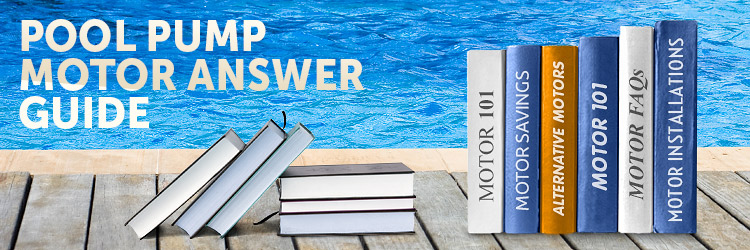

 What Does my Pump Motor Frame Mean?
What Does my Pump Motor Frame Mean?
 Video: Poolside Chat Episode 16- Pump Motor Making a Clicking Sound
Video: Poolside Chat Episode 16- Pump Motor Making a Clicking Sound
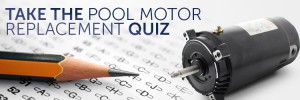 Think You’re Cut Out To Replace Your Pool Pump Motor? Take This Quiz
Think You’re Cut Out To Replace Your Pool Pump Motor? Take This Quiz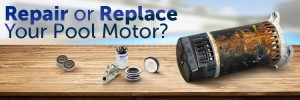 Does It Make Sense To Repair My Pool Pump Motor?
Does It Make Sense To Repair My Pool Pump Motor?
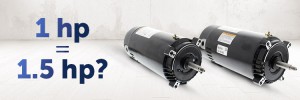
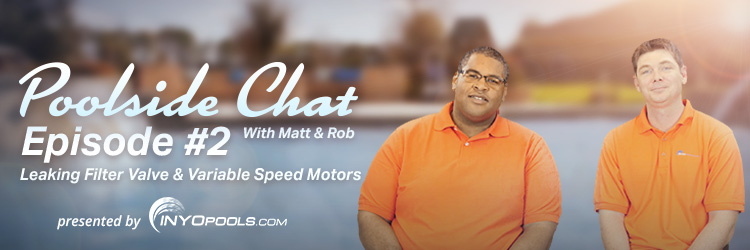
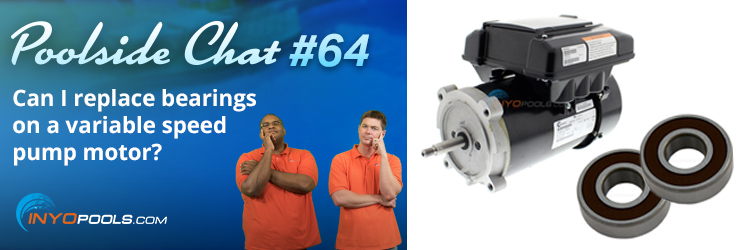
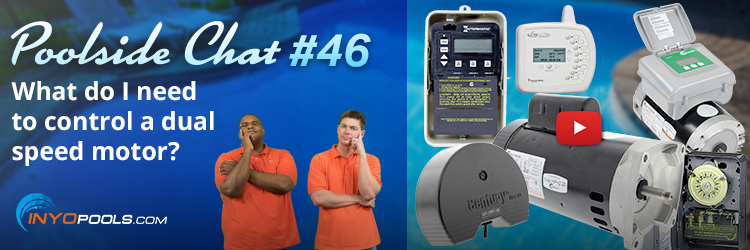
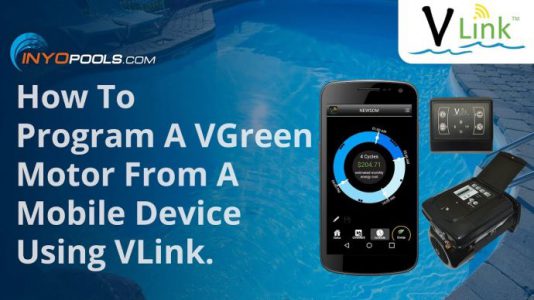






We have Sta-Rite filter and pump set up. we are pretty sure the pump motor is going bad. There’s alot of air and it shuts itself off in less than an hour. And smells slightly of plastic burning Do we have to purchase the same pump/motor that we have or is there one you would recommend? Is there a way to tell how old ours is(not the first owners) It’s a 18×36 pool with a side spa
It would be helpful to have model numbers to know what pump and filter you have. You can figure out the age of the unit if you contact the manufacturer with the serial number.
As for the pump air bubbles and shutting off, one may beget the other. If your system ahs an air leak, which in turn makes your pump run dry, the motor will overheat causing a breaker to trip. I would check the system to figure out why you have air in the system first. How to Identify and Correct Air Leaks
Instead I have two questions:
Can I run my pool pump during the night, to avoid the noise, no matter the temperature outdoor?
Can I run my pump for 4 hours on 24 hours?
Best Regards
Leon
In the summer, you will likely need to run it during the day. But every pool is a little different, so give it a try to see if it will work for your set up.
If your pump can turnover the water in that period of time, then yes you could run it for only 4 hours.
I suggest reviewing this article for more information on pump runt times – How Long Should I Run My Pool Pump?
Yes, you can run you pump mostly as night. But in the hotter months you may have to run the pump an hour or two during the hottest parts of the daybecause chlorine will be getting burned off.
If you can turn over your water at least once in those 4 hours, then yes.
I checked the resistance in the windings . The lower I got a reading of 8 ohms and the upper was 7 ohms. With the capacitor in the circuit I was reading 3.1M ohm and climbing on both so hard to tell if they are the same. Today the voltage reading was right at 240V but our power is not the best and we do get surges. I do have a surge protector on the main service but no other protection going to the pump.
I normally get about 3 years out of a motor and it is the winding that goes. This time the motor starts to spin and quits like there is a heater overload but it only runs a second then I need to wait 10 or 15 seconds before I can try it again with the same results. I have never had an overload protector do that but could that be the issue? Is there any way to test that? I don’t really have enough time to try and get a reading across it after it quits. Is 1 ohm difference between the upper and lower winding enough to cause this issue?
thanks for your help and suggestions.
I do not know how to test the overload protector. You may want to try asking the people over at Trouble Free Pool, they probably have a good group of electricians that can give you a troubleshooting process.
I have a hayward 2 speed 1-1/2hp pump motor. 240V
the motor was tripping out the breaker when trying to start. I thought it was the running capacitor so replaced it. Now it no longer trips the breaker but the motor quits before it gets up to speed. ( does the same thing if I try it on hi or low speed) This motor is only a little over a year old so I hate to trash it and motor shops are not interested in working on a small motor. Any ideas on what could be causing the problem?
thanks, robfnk3
I suggest checking the circuit lead voltage that are feeding your pump. Your voltage may be too low, which would explain why your capacitor failed so quickly. Using the Proper Test Equipment to Troubleshoot Pool Motors Bad motor windings may also be an issue: How To Use a Multimeter to Test a Pool Pump Motor – Winding Resistance
Hi Mr. Motor Dr…
I’m in the process of replacing my motor, however after removing the 4 nuts on the front, it won’t budge; penetrating oil and rubber mallet, and still fused to the plate. I read the video twice (ok, I’ll read it again!). I replaced this motor ? 10 yrs ago or so. Can you drop on by?
Unfortunately, this doctor does not make house calls but we can try to help anyway. What is the make and model of your pump? This will help us determine if there are more parts that need to be removed before unmounting the motor.
cant get pool pump to prime
Read this guide: How To Determine Why a Pool Pump Won’t Prime
Great post really nice
Hi, our pool motor was in its very last leg and broke down last week. Unfortunately, we are in a very tight financial situation and the estimates are about $800 because the pool people recomenda us to switch the front as well. They both seem very old. We don’t have pool experience besides keeping the water clean and running so I don’t know if we can replace the motor ourselves. My questions is, since its tight for us right now, how long can the pool stay if we don’t replace the motor? We are still keeping up with the weekly mantainance. Any advice is very much appreciate it
We have this guide that gives you a routine on how to maintain the water without a pump: How to Maintain a Pool When Your Pump Has Died. You maybe be able to go a week or so before the pools gets really bad.
I have replaced my pool motor and seals. Your guide was very helpful as was the video. Since I have done the replacement when the pump shuts off for the night I lose about a half basket of water. I do not lose the prime, so it does start alright in the morning. I have pulled the motor to ensure everything was installed correctly, it is.
What could be causing this to happen after replacing the motor?
Thanks Dave
If it is still primed, it is probably not a huge issue. It could be that the lid is not on tight enough, or the tiniest bit of air getting into the pump. If it is only a half a basket worth of prime loss, then I wouldn’t worry too much. You could do more harm to the gaskets by repeatedly assembling and disassembling the pump than the normal wear caused by the pump operation.
Hi,
I
My M.I.L. has a US Motors EUSQ1152 motor that needs to be replaced. After removing the 4 lugs in the base plate, the motor won’t slide off the pump housing. It wiggles quite a bit, but won’t come out even after a fair bit of jkstling,/pulling. It seems as if something further in is flared out and causing the obstruction. I have no idea what it is though…Is there any chance the impeller broke off and is wedged in the pump housing in a way that prevents the motor from sliding out? Any ideas would be appreciated!
Thanks!
-Chan
Hello Chan, it would help if you could add pictures, but I know that is a problem with our forum, so you may try asking this question on Inyo’s Forum. But I will give a shot at answering this question.
The four bolts you removed that connect the motor to the seal plate are just one step of removing the motor. The impeller is screwed onto the end of the motor shaft, sandwiching the seal plate, and motor mount onto the motor. You will need to remove the screws mounting the seal plate to the pump housing, and then remove the impeller before the motor can be completely removed.
Try reading this how-to guide for steps: How To Replace the Motor on Your Pool Pump
I replaced my swimming pool motor with exact identical new motor.
I replaced the shaft seal as well. I made the electric connection same as the photograph I took before removing the old electrical connection. Now when I switched the power on, nothing except some hum.
What did I do wrong ?